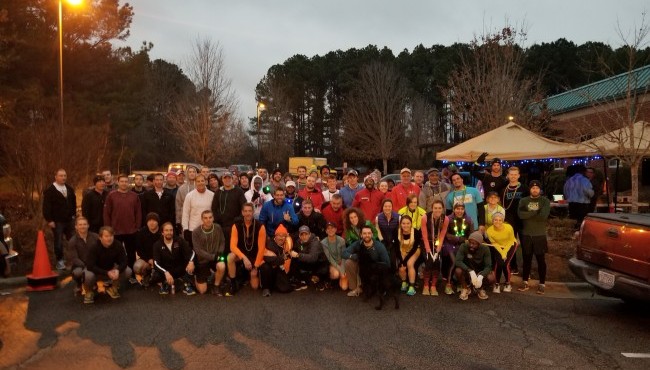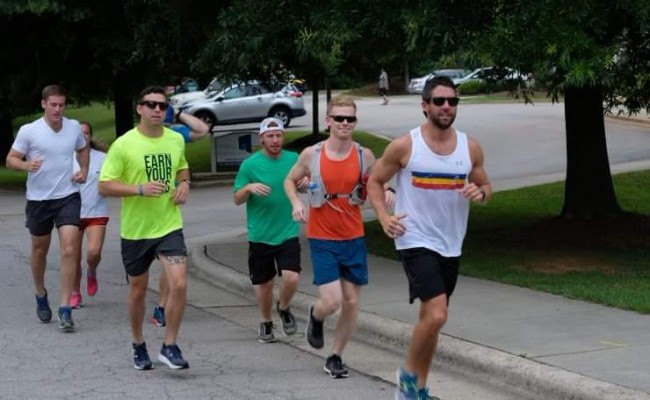
The finish line of a long race is one of the most joyful places on the planet. Completing the task is an amazing feeling — amplified by the fact that it carries such a weight of history. You’re not just celebrating a one-day accomplishment, you’re basking in how far you’ve come. After months of hard work, the finish line is just the icing on the cake, the ultimate culmination of time spent pushing your limits, overcoming the obstacles, and finding the positivity through any and every challenge.
North Carolina natives Justin Garrity and Matt Elliott faced more than their share of obstacles in their respective quests to run half marathons. But when they did, when they crossed their own finish lines, their races were powerful symbols of hope that their lives were going to get better.
“It kind of meant everything,” Garrity, 30, tells me of running his first half marathon about a year after heroin addiction landed him in a homeless shelter. “I worked towards a goal of running this half at a fast pace. I’d done it with positive people in my life. And I was reconnecting with my family.”
Garrity’s struggles with addiction had caused estrangement from the people he loved most, his family. Then, a year after getting sober, he completed the Rock ‘N’ Roll half marathon in Raleigh. His mom ran at his side.
The race was a true “aha!” moment. He was about to move out of the shelter, had gotten a good job, and now, had regained his mother’s trust. Tapping into the power of running, he realized, had changed his life in incredibly positive ways.
“Getting out there and running,” he says. “That’s such a big part of my recovery.”
When Garrity met Matt Elliott, 32, who ended up in the same shelter/recovery program a few years later (the place where Garrity was now employed), he encouraged the newcomer to find help through the same tool. They began running together.
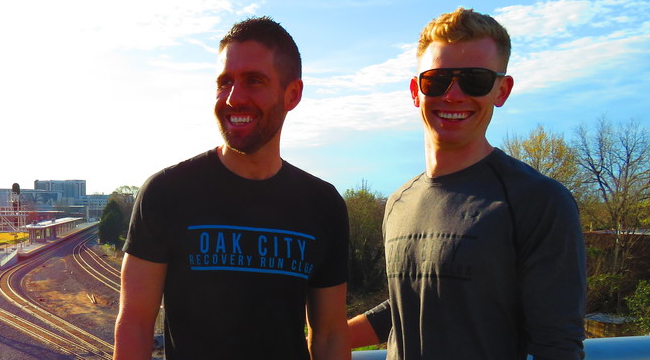
For his part, Elliott had long straddled the thin line between social drinking and alcohol abuse. By the age of 17, he had been arrested twice for DWIs. In college, he prioritized partying and found it hard to get to classes. But lots of college kids drink too much, and plenty of people lose their way for a bit in their early 20s. He was easily able to convince himself that he didn’t have a problem. And for a while, he was able to convince other people of that too. He volunteered for AmeriCorps and Habitat for Humanity, finished for college, got a good job, and then got married.
But behind the facade, drinking became Elliot’s main focus, and everything else was in service of it. He tried to quit, but he relapsed. And in the two short months post-relapse, he lost his wife, car, job, house, and all of his savings. He entered rehab at Healing Transition, having hit his rock bottom.
Healing Transitions is a homeless program in Raleigh, North Carolina that incorporates a free addiction recovery program with its services. The program is about a year long, and while there, the residents are allowed to leave campus for lunch at a soup kitchen downtown every day. The only condition is that they have to walk the six miles there and back. For some, this is a struggle. For Elliott, it was a daily meditation, reminding him of his time as an athlete in high school. He started doing the trip as a run, and slowly became healthier.
As brothers in recovery and bonded by their love of running, Garrity and Elliott became quick friends. Before long, Garrity convinced Elliott to train for the Rock ‘N’ Roll half marathon. Just as it had been for Garrity, the half marathon was an emotional, pivotal experience for Elliot. He ran with friends he’d thought he’d burned bridges with and his wife who had left him. They reconnected.
“Running is a big part of my recovery,” Elliott says. “It saved my life.”
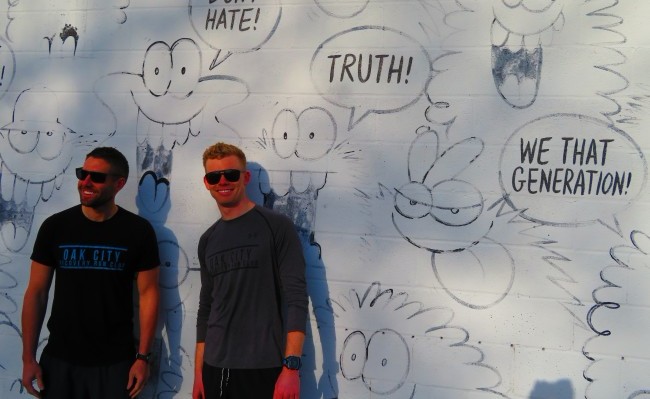
For the person on the brink, running becomes another tool in the problem-solving toolbox, Garrity explains. When you’re struggling with thoughts and feelings of using you can call on your support system or you can go for a run. And running has significant physical benefits that match up well with recovery. Studies have shown people with a smoking addiction who run reduce their use of nicotine, that running helps with underlying depression symptoms that contribute to drug and alcohol use, that it lights up reward systems in a similar way to addictive drugs, and that it can even help the brain repair some of the pathways that were damaged by substance abuse.
“We’re geared towards keeping that dopamine rush that alcohol and drugs provide,” Garrity tells me. “But now, (the brain is) switching gears, seeking out running. We channel what used to be a mental obsession into something positive. Coupled with a positive network…running really helps us in recovery and in sobriety.”
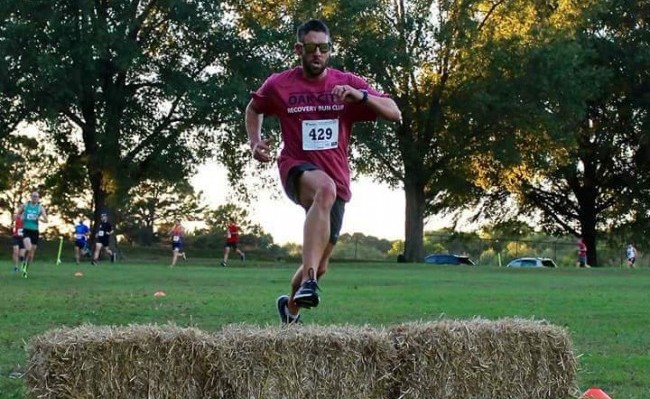
Garrity and Elliott knew that running had helped to lift them out of negative behaviors, and towards a healthier lifestyle. But as they sought out running clubs in the area to participate in and find a community of runners, they kept bumping into the same problem.
“A lot of the run clubs meet and circle back at a local bar or restaurant, with usually a drink or two afterward,” Elliott says. “We were just kind of looking for an atmosphere with a fellowship, with a fun group activity, and a good place to socialize, but also a place good for people in recovery to meet.”
The more they looked, the more they found that such a place didn’t exist n their area. It’s not easy being in your late 20s/early 30s as an addict. Social events are centered around going to bars, parties have wine and beer flowing freely, and meals involve friends asking if they should just buy a bottle for the table. The pair found that even running clubs were based on getting a drink as a reward.
Garrity had long talked about how great it would be to start a running group that centered around recovery. Running had been so significant in his own sobriety, and he knew it could reach others as well. But it wasn’t until Elliott got the ball rolling that they put plans in place to actually do so.
“Elliott’s a man of action,” Garrity says with a laugh. “You can put that in your article.”
Last April, they founded the Oak City Recovery Run Club. It centers around running as a tool of recovery and outlet for those looking to socialize through a positive, healthy activity.
“We want to be a place where you can alleviate that pressure of, “Oh, I need to go to a bar, ’cause that’s what everyone does,” Garrity says. “Well, let’s do this positive lifestyle change. Go run, go hang out with some folks for a little bit.”
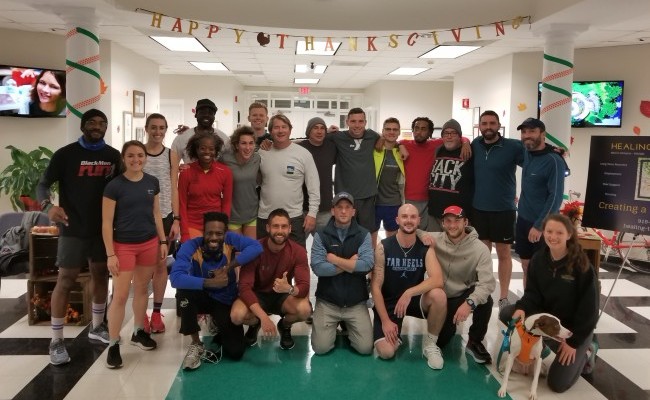
The club, which started with just a few eager runners, has exploded over the past six months. These days, they often have 30 or 40 people running on a night, they tell me. The group is attractive for people trying to stay sober who are looking for fellowship and connection without the pressure to drink. As it grows, it’s a constant reminder that there is no one kind of addict.
“We’ve got lawyers, and judges, and successful people out here interacting with each other and running with each other who probably would never talk to each other on the street,” Elliott tells me. “I definitely think it’s the most diverse run group in Raleigh.”
Stigma over addiction and a long tradition of anonymity in many recovery programs (in order to protect members) often keep people in the dark when it comes to understanding who is or could be an addict. They think it can’t happen to them because they don’t fit the addiction stereotype they hold in their minds. But the running club is a reminder that anyone can have a substance abuse problem.
It’s also a testament that there’s always hope.That change is possible.
“Matt and I come from rather affluent families,” Garrity says. “We both went to college, we both played sports at a high level through high school. And I’ll speak for me. I never thought in a million years I’d end up in a homeless shelter, right? This isn’t supposed to happen to me. But it did.”
Elliott has been sober now for a year and a half, Garrity for almost four years, and helping others who are struggling through the beginning stages of recovery has become their passion. They work closely with the Healing Transitions Center to make sure that no one is barred from joining the run club just because they can’t afford the shoes or gear. They partner with a local run store, Runologie, and get donated supplies. They sponsor their participants so they can participate in races and events. And it brings them great pride to see the joy on the faces of the runners after a race.
For some of the recovering addicts, the run club is the first thing that has brought them joy in a long time. You feel broken in a shelter, Garrity explains. Drugs and alcohol have taken your family and job, and you’re living in a shelter. It’s a very low point in their lives. But running with the club brings a little bit of hope.
“I can’t tell you how awesome it is to see somebody that’s living on a mat on the floor, with a trash bag for clothes, and that’s it, and they go run,” he says. “Maybe they just run-walk or just barely make it a mile, and the next week, he’s like, man, I made it all the way to the stop sign. That’s a little over a mile and a half! Then, four weeks later, he’s like, ‘Dude, I did all three miles.’ He’s amped up. He’s like, I’m getting feeling back in my muscles. I’m getting there. I’m making progress.”
As the runners start making goals and crushing them, Garrity feels incredibly inspired. For Elliott, inspiration comes in the form of the connections he sees in the group. No matter how different his background is from another runner, they understand each other on a certain level.
“I run with them and hear their story … and they’re telling my story, too, right?” he says. “I can relate to a lot of these guys even though I’ve never met them. And when I get to share my story on long runs with guys, it’s therapy for me.”
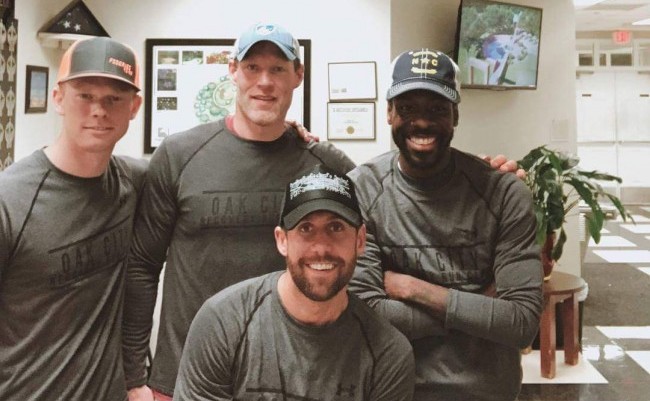
As for Garrity and Elliott’s running, they continue to up their challenges. At a recent 50k ultra, Garrity marveled at how far they’ve both come mentally and physically. And on April 20th of this year, Elliott plans to do a 100-mile race in Utah with friends who are also in recovery. It’ll be a spiritual experience, he says.
“It does speak to recovery right there!” Garrity chimes in. The pride in his voice for his friend is palpable. “I mean, that’s it. You can go from a pretty low place in life to running 100 miles. I think that’s what recovery can do for us, give us the mental strength we might have not ever imagined we had.”
“I run today with such gratitude of just being back in life again,” Elliott says. “For a long time, I really didn’t contribute much to life, and didn’t really experience life as I should have been. And today, running has taken me to great places. I experience a lot of joy in life again through running.”
As Oak City Recovery Run Club grows, Garrity who works at Healing Transitions and changed his life path to help addicts like himself, just hopes that he can help others find their way to the natural high of running, that it will lift them up in their lowest point. Helping others through running is what keeps him going these days.
“The group gives me a lot of gratitude,” he says. “And to be able to maybe, hopefully, help some guys along their way to sobriety? That’s just …” He pauses. “I mean, that’s it. That’s why we wake up. That’s why we do this. That’s what it is for me.”
